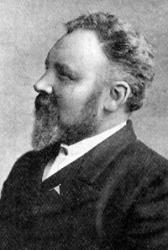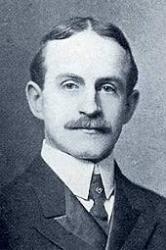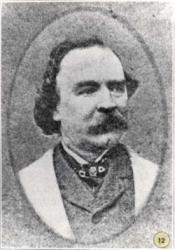Planning worship?
Check out our sister site, ZeteoSearch.org,
for 20+ additional resources related to your search.
- |
User Links
Person Results
Pauline Klecker Fisher
Topics: Songs Suitable for Primary Author of "If I Had Been a Shepherd" in Children's Hymnal
Pauline Klecker Fisher
Lowell Mason

1792 - 1872 Topics: Songs Suitable for Primary Composer of "[The many, many children]" in Children's Hymnal Dr. Lowell Mason (the degree was conferred by the University of New York) is justly called the father of American church music; and by his labors were founded the germinating principles of national musical intelligence and knowledge, which afforded a soil upon which all higher musical culture has been founded. To him we owe some of our best ideas in religious church music, elementary musical education, music in the schools, the popularization of classical chorus singing, and the art of teaching music upon the Inductive or Pestalozzian plan. More than that, we owe him no small share of the respect which the profession of music enjoys at the present time as contrasted with the contempt in which it was held a century or more ago. In fact, the entire art of music, as now understood and practiced in America, has derived advantage from the work of this great man.
Lowell Mason was born in Medfield, Mass., January 8, 1792. From childhood he had manifested an intense love for music, and had devoted all his spare time and effort to improving himself according to such opportunities as were available to him. At the age of twenty he found himself filling a clerkship in a banking house in Savannah, Ga. Here he lost no opportunity of gratifying his passion for musical advancement, and was fortunate to meet for the first time a thoroughly qualified instructor, in the person of F. L. Abel. Applying his spare hours assiduously to the cultivation of the pursuit to which his passion inclined him, he soon acquired a proficiency that enabled him to enter the field of original composition, and his first work of this kind was embodied in the compilation of a collection of church music, which contained many of his own compositions. The manuscript was offered unavailingly to publishers in Philadelphia and in Boston. Fortunately for our musical advancement it finally secured the attention of the Boston Handel and Haydn Society, and by its committee was submitted to Dr. G. K. Jackson, the severest critic in Boston. Dr. Jackson approved most heartily of the work, and added a few of his own compositions to it. Thus enlarged, it was finally published in 1822 as The Handel and Haydn Society Collection of Church Music. Mason's name was omitted from the publication at his own request, which he thus explains, "I was then a bank officer in Savannah, and did not wish to be known as a musical man, as I had not the least thought of ever making music a profession." President Winchester, of the Handel and Haydn Society, sold the copyright for the young man. Mr. Mason went back to Savannah with probably $500 in his pocket as the preliminary result of his Boston visit.
The book soon sprang into universal popularity, being at once adopted by the singing schools of New England, and through this means entering into the church choirs, to whom it opened up a higher field of harmonic beauty. Its career of success ran through some seventeen editions. On realizing this success, Mason determined to accept an invitation to come to Boston and enter upon a musical career. This was in 1826. He was made an honorary member of the Handel and Haydn Society, but declined to accept this, and entered the ranks as an active member. He had been invited to come to Boston by President Winchester and other musical friends and was guaranteed an income of $2,000 a year. He was also appointed, by the influence of these friends, director of music at the Hanover, Green, and Park Street churches, to alternate six months with each congregation. Finally he made a permanent arrangement with the Bowdoin Street Church, and gave up the guarantee, but again friendly influence stepped in and procured for him the position of teller at the American Bank.
In 1827 Lowell Mason became president and conductor of the Handel and Haydn Society. It was the beginning of a career that was to win for him as has been already stated the title of "The Father of American Church Music." Although this may seem rather a bold claim it is not too much under the circumstances. Mr. Mason might have been in the average ranks of musicianship had he lived in Europe; in America he was well in advance of his surroundings. It was not too high praise (in spite of Mason's very simple style) when Dr. Jackson wrote of his song collection: "It is much the best book I have seen published in this country, and I do not hesitate to give it my most decided approbation," or that the great contrapuntist, Hauptmann, should say the harmonies of the tunes were dignified and churchlike and that the counterpoint was good, plain, singable and melodious.
Charles C. Perkins gives a few of the reasons why Lowell Mason was the very man to lead American music as it then existed. He says, "First and foremost, he was not so very much superior to the members as to be unreasonably impatient at their shortcomings. Second, he was a born teacher, who, by hard work, had fitted himself to give instruction in singing. Third, he was one of themselves, a plain, self-made man, who could understand them and be understood of them."
The personality of Dr. Mason was of great use to the art and appreciation of music in this country. He was of strong mind, dignified manners, sensitive, yet sweet and engaging.
Prof. Horace Mann, one of the great educators of that day, said he would walk fifty miles to see and hear Mr. Mason teach if he could not otherwise have that advantage.
Dr. Mason visited a number of the music schools in Europe, studied their methods, and incorporated the best things in his own work. He founded the Boston Academy of Music. The aim of this institution was to reach the masses and introduce music into the public schools. Dr. Mason resided in Boston from 1826 to 1851, when he removed to New York. Not only Boston benefited directly by this enthusiastic teacher's instruction, but he was constantly traveling to other societies in distant cities and helping their work. He had a notable class at North Reading, Mass., and he went in his later years as far as Rochester, where he trained a chorus of five hundred voices, many of them teachers, and some of them coming long distances to study under him. Before 1810 he had developed his idea of "Teachers' Conventions," and, as in these he had representatives from different states, he made musical missionaries for almost the entire country. He left behind him no less than fifty volumes of musical collections, instruction books, and manuals.
As a composer of solid, enduring church music. Dr. Mason was one of the most successful this country has introduced. He was a deeply pious man, and was a communicant of the Presbyterian Church. Dr. Mason in 1817 married Miss Abigail Gregory, of Leesborough, Mass. The family consisted of four sons, Daniel Gregory, Lowell, William and Henry. The two former founded the publishing house of Mason Bros., dissolved by the death of the former in 1869. Lowell and Henry were the founders of the great organ manufacturer of Mason & Hamlin. Dr. William Mason was one of the most eminent musicians that America has yet produced.
Dr. Lowell Mason died at "Silverspring," a beautiful residence on the side of Orange Mountain, New Jersey, August 11, 1872, bequeathing his great musical library, much of which had been collected abroad, to Yale College.
--Hall, J. H. (c1914). Biography of Gospel Song and Hymn Writers. New York: Fleming H. Revell Company.
Lowell Mason
Oliver Houston, Jr.
b. 1928 Topics: Songs Suitable for Primary Composer of "[We want to learn of Jesus and]" in Children's Hymnal
Oliver Houston, Jr.
Michael Praetorius

1571 - 1621 Topics: Songs Suitable for Primary Composer (melody) of "[We will be merry, far and wide]" in Children's Hymnal Born into a staunchly Lutheran family, Michael Praetorius (b. Creuzburg, Germany, February 15, 1571; d. Wolfenbüttel, Germany, February 15, 1621) was educated at the University of Frankfort-an-der-Oder. In 1595 he began a long association with Duke Heinrich Julius of Brunswick, when he was appointed court organist and later music director and secretary. The duke resided in Wolfenbüttel, and Praetorius spent much of his time at the court there, eventually establishing his own residence in Wolfenbüttel as well. When the duke died, Praetorius officially retained his position, but he spent long periods of time engaged in various musical appointments in Dresden, Magdeburg, and Halle. Praetorius produced a prodigious amount of music and music theory. His church music consists of over one thousand titles, including the sixteen-volume Musae Sionae (1605-1612), which contains Lutheran hymns in settings ranging from two voices to multiple choirs. His Syntagma Musicum (1614-1619) is a veritable encyclopedia of music and includes valuable information about the musical instruments of his time.
Bert Polman
Michael Praetorius
Walter John Mathams

1853 - 1931 Person Name: Walter Mathams Topics: Songs Suitable for Primary Author of "Jesus, Friend of All the Children" in Children's Hymnal Mathams, Walter John, was born in London, Oct. 30, 1853. Early in life he went to sea; but on returning through Palestine to England he began to study for the Ministry. In 1874 he entered the Regent's Park Baptist College as a Student, and subsequently had a pastoral charge at Preston, Lancashire. In 1879, his health failing, he went for a time to Australia and other places. Returning to England, he became, in 1883, minister at Falkirk, Scotland, and in 1888, at Birmingham. Whilst a student, he published a small volume of hymns and poems as At Jesus' Feet, (1876). He is also the author of several religious books of a popular character, as: Fireside Parables, 1879; Sunday Parables, 1883, &c. His principal hymns are:—
1. Bright falls the morning light. Morning.
2. Gentle Jesus, full of grace. Learning of Christ.
3. Go, work for God, and do not say. Christian Work.
4. God loves the little sparrows. Divine Providence.
5. Jesus, Friend of little children. Child's Prayer to Christ.
6. My heart, 0 God, be wholly Thine. Consecration.
7. No room for Thee, Lord Jesus. No room for
Christ.
8. Reign in my heart, Great God. Consecration.
9. Sailing on the ocean. Life a Voyage.
Nos. 1 and 6 of these hymns first appeared in his At Jesus’ Feet, 1876. Mr. Mathams has written several other hymns which have appeared in magazines and elsewhere. One of these, "Good has come from Nazareth," has been set to music by Dr. E. J. Hopkins. The 9 hymns named above are mainly in Baptist hymnbooks. [Rev. W. R. Stevenson, M.A.]
-- John Julian, Dictionary of Hymnology (1907)
==============
Mathams, W. J. , p. 718, ii. Mr. Mathams entered the ministry of the Established Church of Scotland in 1900, acted for two years as chaplain to the Scottish forces in Egypt, and is now (1906) minister in charge of the parish of Stronsay, Orkney. His recent hymns include:—
1. Captain and Comrade of us all. [For Soldiers and Sailors.] Written and printed for use at a service held at Gourock Parish Church, April 10, 1904, on behalf of the Queen Victoria Memorial School for sons of Scottish sailors and soldiers.
2. From heights where God is reigning. [Boys' Brigade.] Written, 1905, for the S. S. Hymnary, 1905.
3. God is with us, God is with us. [Christian Warfare.] Written by request of the Nat. Council of Evang. Free Churches, first sung at their Congress at Nottingham, 1896, and published in the Christian Endeavour Hymnal, 1896.
4. Lord Jesus Christ! for love of Thee. [Christian Warfare.] Written in 1899, in connection with the Centenary Fund of the Congreg. Union. In the Sunday School Hymnary, 1905.
5. 0 Christ, sweet Rose of Sharon. [The Rose of Sharon.] Contributed to the Christian Endeavour Hymnal, 1896.
We may add that of the hymns noted at p. 718, ii., Nos. 2, 3, 4, 5, 8, 9 were contributed to the Baptist Psalms and Hymns for School and Home, 1882, and that No. 7, first printed as a leaflet in 1878, is in the Suppl. of 1880 to the Baptist Psalms and Hymns. [Rev. James Mearns, M.A.]
--John Julian, Dictionary of Hymnology, New Supplement (1907)
Walter John Mathams
Calvin Weiss Laufer

1874 - 1938 Person Name: Calvin W. Laufer Topics: Songs Suitable for Primary Author (stanza 3) of "The Lord Is Ever Near" in Children's Hymnal Presbyterian minister and hymnographer Calvin Weiss Laufer was born today in Brodheadsville, Pennsylvania in 1874. Following his graduation from Union Seminary in 1900 he was ordained into the Presbyterian ministry and led congregations in New York and New Jersey for several years.
Laufer had a generally cheerful outlook on his Christian life, and his first two books, Key-Notes of Optimism (1911) and The Incomparable Christ (1914) expressed that viewpoint. A review of the first book spoke of the "crisp and stirring note in these sermonettes which is well calculated to rouse the mind of readers and banish dejection." His books were popular in their time but today are seen as somewhat superficial.
He later began to work with the Presbyterian Board of Christian Education and became its editor of musical publications, producing books such as The Junior Church School Hymnal (1927), The Church School Hymnal for Youth (1928) and When the Little Child Wants to Sing (1935). He was also the associate editor of the Presbyterian Hymnal of 1933, a very popular book which was used in many churches for more than fifty years.
In 1932, his book Hymn Lore was published, which contained the stories of fifty hymns from The Church School Hymnal for Youth, with information about their writers and composers (much like this blog). He chose a broad range of hymns, some quite modern and others well-known and loved for centuries. Several of them were by his mentor and friend Louis F. Benson, who had edited the Presbyterian Hymnal of 1895 and its 1911 revision (and also wrote The Best Church Hymns). In the preface to Hymn Lore, Laufer wrote:
To live with hymns and to make them one's own is the only sure way of appreciating their literary beauty and spiritual power. (...) That the reading and singing of hymns may become less mechanical, more thoughtful and intelligent, and emotionally more effective, this volume is released to the public.
Laufer wrote both hymn texts and tunes himself, most of which first appeared in the books he edited but also had some life outside Presbyterian circles. This tune was written while Laufer was attending a conference in Kansas, though with no particular text in mind. Not long after, he hummed it to a friend, William H. Foulkes, who then wrote the text "Take thou our minds, dear Lord."
Laufer's tune was originally called STONY BROOK, but he changed it to honor a friend, William Ralph Hall. Little is known about the writer May Pierpont Hoyt. Her text is generally sung to the tune BREAD OF LIFE by William F. Sherwin, but since that tune is more known with "Break thou the Bread of life," this text could use a different one.
--conjubilant.blogspot.com/2010/04/
Calvin Weiss Laufer
John H. Maunder

1858 - 1920 Topics: Songs Suitable for Primary Composer of "[The whole wide world for Jesus!]" in Children's Hymnal John Henry Maunder United Kingdom 1858-1920. Born at Chelsea, England,,the son of a carpenter, he attended the Royal Academy of Music. He began his career as a theatre composer, but later specialized in sacred music for the Anglican Church. He became an author and composer, as well as a musician. He was organist at St. Matthew’s, Sydenham (1876-77); St. Paul’s, Forest hill (1878-1879); and at churches in Blackheath and Sutton. He married Ellen Fanny Fulgoux Dakin, and they had a daughter, Winifred. He provided musical accompaniment for concerts in Albert Hall, and, in 1881, conducted the Civil Service Vocal Union. He wrote about 20 church anthems, 10 cantatas, several carols, tunes for around 30 hymns, 19 songs and ballads, 12 services and canticles, two operettas, and six instrumentals. His best known cantata was “Olivet to Calvary”. He was known for his good musical style and great technical facility. His compositions were full of melodic ideas and were written for ease of interpretation. He died at West Brompton, London, England.
John Perry
John H. Maunder
W. K. Bassford
1839 - 1902 Topics: Songs Suitable for Primary Composer of "[Can a little child, like me]" in Children's Hymnal Bassford, William Kipp was born on April 23, 1839, in New York City. He first studied harmony and composition under Samuel Jackson, who was for some time organist at St. Bartholomew’s Church in New York. While still young, he traveled extensively with a concert troupe as a pianist. He eventually settled in New York as a teacher, where he was living as of 1885. He wrote a number of secular songs, a mass in E♭, and some other church pieces. He also wrote a two-act opera, Cassilda. He died on December 22, 1902 in New York City.
© The Cyber Hymnal™ (www.hymntime.org/tch)
W. K. Bassford
Esther Freivogel
Topics: Songs Suitable for Primary Author of "When in the Quiet Church I Sit" in Children's Hymnal
Esther Freivogel
Harry Silvernale Mason
1881 - 1964 Person Name: Harry S. Mason Topics: Songs Suitable for Primary Harmonizer of "[Surely the Lord is in this place]" in Children's Hymnal
Harry Silvernale Mason


 My Starred Hymns
My Starred Hymns

